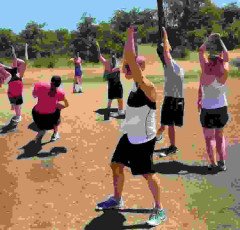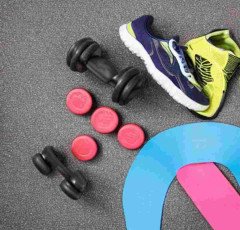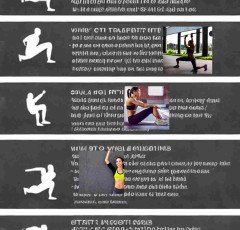Starting a fitness journey may be both thrilling and tough, but with the appropriate approach, you can put yourself on the right track. Here's a step-by-step procedure:
Set specific objectives
Begin by outlining your fitness objectives. Having specific goals will guide your overall workout regimen, whether you want to reduce weight, gain muscle, enhance cardiovascular health, or increase flexibility.
visit a Doctor, It is critical to visit your doctor before beginning any new fitness regimen, especially if you have pre-existing health concerns. They can provide you tailored counsel and make sure you're medically cleared to exercise.
Begin slowly, achieve not attempt to achieve too much too quickly. Begin with exercises of moderate intensity, such as brisk walking, cycling, or swimming. To minimize injury and exhaustion, gradually increase the duration and intensity over time. Warm-up and cool-down, Always begin your workout with a thorough warm-up. This could consist of 5-10 minutes of gentle exercise and dynamic stretching. Similarly, finish your workout with static stretches to enhance flexibility and reduce muscular soreness. Cardio and strength training should be combined: A well-rounded fitness regimen should include both aerobic workouts (such as running, cycling, or dancing) and strength training (such as utilizing weights, resistance bands, or bodyweight exercises). Cardiovascular exercise aids in weight loss and cardiovascular health, but strength training builds muscle and increases metabolism.
Maintaining appropriate form is essential when practicing exercises to avoid injury.
Consider working with a personal trainer, viewing instructional videos, or using fitness apps with guided workouts if you're confused about the proper technique.
Maintain Consistency, Consistency is essential for growth. Aim for at least 150 minutes of moderate-intensity cardio per week or 75 minutes of vigorous-intensity cardio per week, as well as 2-3 days of strength training per week.
Rest and Recovery, Allow your body to recuperate. Muscles require rest in order to mend and develop stronger. Aim for 7-9 hours of decent sleep per night, and schedule rest days into your schedule. Keep Hydrated and Eat Well, Hydration is critical for peak performance. Drink plenty of water throughout the day and eat a well-balanced diet rich in lean proteins, whole grains, fruits and vegetables, and healthy fats. Avoid processed foods and too much sugar.
Pay Attention to Your Body
Take note of how your body feels. It's okay to scale back or take a break if you're suffering pain, dizziness, or extreme weariness. Pushing through pain can result in injury.
Stay Motivated, Figure out what motivates you. It may be charting your progress, working out with a friend, creating goals and rewarding yourself for reaching them, or trying new things to keep things interesting.
Keep a fitness notebook or use a fitness app to document your workouts, measurements, and accomplishments. This allows you to track your progress and make any required changes to your regimen.
Everybody's fitness journey is different. Be kind to yourself and appreciate your accomplishments along the road. Consider employing a certified personal trainer to provide personalized coaching and assistance if you ever feel overwhelmed.
Maintain Flexibility in Your Plan, Life is unpredictable, and there will be days when your planned workout simply isn't possible. Instead of becoming disheartened, have backup plans in place, such as a shorter workout or a different activity that you can undertake in an emergency.
Stay Positive and Patient, It takes time to make progress, and there will be ups and downs along the way. Celebrate even minor accomplishments and concentrate on the good changes you're implementing in your life.
Set Realistic Expectations, Aiming high is fine, but setting realistic goals helps to avoid disappointment. Recognize that big improvements take time, and that steady development is more sustainable than quick adjustments. Maintain Hydration, Hydration is essential for overall health and performance. Drink water throughout the day, and if you're doing tough workouts, try drinking electrolyte-rich drinks afterward.
Warm-ups and cool-downs should not be skipped
Warming up your muscles prepares them for the workout and lowers your risk of injury. Cooling down aids in the recovery of your body and minimizes post-exercise muscular discomfort.
Avoid Making Comparisons, Each person's fitness path is unique. Comparing your success to that of others can be discouraging. Concentrate on your own advancements and keep in mind that you are working toward your particular objectives.
Keep diet in Mind: While exercise is crucial, diet also plays a role in your overall fitness. Aim for a well-balanced diet that will help you with energy, muscular recovery, and general health. Stay Engaged and Diverse, Vary your workouts to avoid becoming bored. Trying new things not only keeps things interesting, but it also pushes your body in new ways. Stay Safe, Safety should always come first. Use suitable equipment, such as well-fitting shoes and appropriate clothing, and exercise in well-lit, risk-free locations. Keep Learning, Continue to educate yourself about fitness, nutrition, and health. Understanding the ideas underlying your routine can assist you in making educated decisions and tailoring your approach to your own needs. Stay Social, Exercising with a friend or enrolling in a fitness class can make exercise more fun and help you stay accountable. Having a support system might help you stay motivated on days when your excitement wanes. Maintain Adaptability, Be prepared to modify your workout regimen when circumstances change. Life events, vacations, or professional commitments may necessitate a change in routine, but the goal is to find methods to stay active even in difficult situations. keep Motivated, To keep motivated, follow fitness influencers, read success stories, and immerse yourself in good content. Participating in the fitness community can provide you with new ideas and keep you focused on your goals.
Your fitness path is a personal one, and the most essential thing is that you're moving in the direction of a better, more active lifestyle. Stay patient, persistent, and determined, and you'll see the fruits of your labor over time.
Maintain Balance, Not only in your workouts, but also in your approach to fitness, balance is crucial. Overtraining can result in burnout and injury. Include rest days, stretching, and relaxing activities such as yoga or meditation.
Maintain Proper Form, Maintaining proper form is essential for avoiding injuries and maximizing the efficiency of your activities. If you're worried about your form, consider working with a personal trainer or checking yourself using mirrors and video lessons. Maintain a Regular Sleep Schedule, Sleep is when your body heals and recovers. Make consistent sleep patterns a priority to help you on your fitness path. Avoid using electronics before bedtime and establish a relaxing evening routine. Stay Motivated by Music, Make a workout playlist of your favorite happy music. Music may lift your spirits, divert you from tiredness, and make your workouts more enjoyable. Stay Patient with Plateaus, It's normal to hit a point in your journey where you feel like you're not making any progress. Don't be disappointed; these plateaus are opportunities to rethink your routine, change your goals, and continue to push yourself. Maintain Body Tune, Pay attention to how your body reacts to different activities and intensities. Adjust your schedule according to how you feel, and don't be afraid to change or scale back if necessary. Maintain Consistent Hygiene, Maintaining proper hygiene is critical, especially if you use gym equipment. To avoid the spread of germs, wipe down equipment after use and maintain proper personal hygiene. Maintain Your Focus, Divide your major fitness goals into smaller, more manageable milestones. Tracking your progress toward these modest goals might help you feel accomplished and motivated. Keep Hydrated Throughout the Day, Don't just drink water throughout your workout. Keep yourself hydrated throughout the day to support your body's functioning and improve your workout performance. Maintain Positive Self-Talk, Develop a positive inner conversation. Replace self-doubt with affirmations and concentrate on your success. Have faith in your abilities to overcome obstacles. Stay Grateful for Your Body, Rather of focusing entirely on what you wish to change, consider what your body can currently do. Gratitude might help you maintain a healthier perspective and appreciate the process more.Stay Informed About Supplements, If you're thinking about taking supplements, do your research and speak with a healthcare expert first. While some supplements can help you on your fitness path, they are not a replacement for a well-balanced diet. Keep Rest Days in Mind, Rest days are critical for healing. Pushing oneself too hard without taking enough pauses can lead to weariness and reduced performance. Stay Resilient in the Face of Obstacles, Obstacles are an inevitable element of any path. Allow a missed workout or a brief interruption in your regimen to undermine your development. Return to your feet and keep moving forward. Remember to be proud of your efforts, Every step you take toward a better lifestyle is a stride in the right path. Be proud of your efforts, regardless of the magnitude of your accomplishments.
Taking on a fitness journey is a commitment to your well-being, so approach it with patience, positivity, and a willingness to learn and adapt. Maintain your commitment to your goals while also remembering to enjoy the journey.
Maintain Your Recovery Knowledge, Recovery is equally as vital as working out. Learn about foam rolling, massage, and stretching techniques to help relieve muscle tension and encourage speedier recovery. Experiment and Stay Curious, Keep an open mind and be willing to attempt new exercises, routines, or fitness classes. Exploring various alternatives will assist you in discovering what you enjoy and what works best for your body. Keep Mental Health in Mind, Physical fitness and mental health go hand in hand. Exercise can help to alleviate tension and anxiety. In order to handle stress, incorporate mindfulness methods such as deep breathing or meditation. Maintain Your Recovery Knowledge, Recovery is equally as vital as working out. Learn about foam rolling, massage, and stretching techniques to help relieve muscle tension and encourage speedier recovery.Experiment and Stay Curious, Keep an open mind and be willing to attempt new exercises, routines, or fitness classes. Exploring various alternatives will assist you in discovering what you enjoy and what works best for your body.Keep Mental Health in Mind, Physical fitness and mental health go hand in hand. Exercise can help to alleviate tension and anxiety. In order to handle stress, incorporate mindfulness methods such as deep breathing or meditation.Adapt to Challenges, Life can give you unexpected curveballs. If you're on the road, short on time, or experiencing other challenges, come up with inventive solutions. Keep an open mind about body changes, Bodies change at their own speed. Rather than worrying about immediate physical changes, concentrate on improvements in your performance, energy levels, and overall well-being.Maintain Good Posture Throughout the Day, Maintain good posture throughout the day, not just during workouts. Proper posture helps to maintain muscular balance and can help to avoid discomfort and injury. Adapt to Life Transitions, As your life changes, your fitness program may need to alter as well. Adjust your workout routine to accommodate pregnancy, parenthood, and employment changes.
Keep in Touch with Your Intuition
Your body frequently understands what it requires. Trust your intuition and give yourself the flexibility if you feel like taking a day off or changing up your schedule.
Stay Grateful for Progress, Consider how far you've gone since beginning your fitness adventure. Celebrate the tiny victories and use them as fuel to keep moving forward.
Prepare for setbacks, It's natural to confront obstacles that break your routine. When you have setbacks, remind yourself that they are only temporary and focused on your long-term goals.
Visualization can help you stay motivated by imagining yourself reaching your exercise goals.
Even before you attain your goals, visualization can enhance your drive and give you a sense of accomplishment.
Stay Emotionally Connected, Choose activities that you enjoy to develop a positive relationship with fitness. When exercise is pleasurable, you are more likely to persist with it over time.
Stay Reflective, Evaluate your fitness progress on a regular basis. Take note of what works well, what needs to be tweaked, and how you've improved in terms of physical fitness and mental resilience.
Consistency, patience, and a willingness to learn and adapt are the keys to success. Each stride you take is a step forward in your quest for a better, more vibrant existence.
Maintain Your Curiosity About Nutrition, Educate yourself about your body's dietary requirements. To make informed nutritional decisions, learn about macronutrients (proteins, carbs, and fats) and micronutrients (vitamins and minerals).
Keep Physical Activity Fun, Physical activity does not always have to be serious. Participate in things you enjoyed as a youngster, such as dance, sports, or simply jumping on a trampoline. Playfulness can rekindle your passion. Keep Overtraining in Mind, Exhaustion, poor performance, and even injury can result from overtraining. Listen to your body and plan rest days to ensure healthy recovery. Maintain Your Injury Prevention Knowledge, Learn about common workout-related injuries and how to avoid them. This knowledge can assist you in making educated decisions and avoiding unneeded setbacks. Maintain Stress Levels, While exercise can help alleviate stress, excessive exercises may have the opposite impact. Choose workouts that correspond to your stress levels, preferring relaxing routines such as yoga on extremely stressful days. Keep Hormones in Mind, Hormones can play a vital impact in your fitness journey. Understand how things such as your menstrual cycle might affect your energy levels and alter your workouts accordingly. Maintain Your Participation in Online Communities, Online fitness communities can provide you with support, advice, and inspiration. Join health and fitness forums, social media groups, or platforms to interact with others who share your interests.Maintain an Open Mind to Restorative activities, Incorporate restorative activities into your routine, such as mild stretching, meditation, and deep breathing. These techniques can help with stress management, flexibility, and overall well-being.
Stay Thankful for Small-Scale Victories
Celebrate accomplishments other than weight loss or muscle building. Increased energy, better sleep, a better attitude, and increased confidence are all important indicators of improvement.
Stay Hydrated After Exercise, Rehydrate after exercise to restore fluids lost through sweat. Water is OK, but if you've worked out hard, try including electrolyte-rich drinks or snacks.
Adapt to Changing Goals, Your goals may change as you advance. Be willing to change your training program to meet your changing goals.Keep an eye out for mental roadblocks, Mental roadblocks can prevent you from attaining your athletic potential. Recognize and replace negative self-talk with positive affirmations.Keep in Mind Lifestyle Factors, Lifestyle decisions such as smoking, excessive alcohol consumption, and lack of sleep can all have an affect on your fitness progress. Address these issues to improve your overall health.Maintain an Open Mind, If you are feeling overwhelmed or unsure, try getting advice from fitness specialists such as personal trainers, nutritionists, or physical therapists.Maintain Goal Reflection, Review your fitness goals on a regular basis. Set new tasks to keep yourself motivated and adjust them as needed based on your progress.Remember to be proud of your efforts, Taking steps toward better health is a huge accomplishment. Be proud of your dedication to your own well-being.
Accept your fitness journey as an ongoing investigation of what your body is capable of. Maintain your adaptability, curiosity, and compassion for yourself as you strive for a healthier, more active lifestyle.

























































































 Sennheiser
Sennheiser  One World Collection
One World Collection  Unreal Engine 5 For Beginners Learn The Basics Of Virtual Production
Unreal Engine 5 For Beginners Learn The Basics Of Virtual Production  The Click Engine
The Click Engine  Smart Doorbell
Smart Doorbell  Unlimited access to classes on illustration, photography, design, film, music
Unlimited access to classes on illustration, photography, design, film, music  Graphics & Design
Graphics & Design  Only For The United States
Only For The United States  Favorite Company (Cuelinks)
Favorite Company (Cuelinks)  Hello Theme
Hello Theme  ASPINAL LONDON
ASPINAL LONDON  All Wireless Products
All Wireless Products  Best Sellers On Amazon
Best Sellers On Amazon  Online Marketing
Online Marketing  ASUS Laptop
ASUS Laptop  Women Fashion
Women Fashion  Best Selling Books
Best Selling Books  Men Clothing
Men Clothing  Best Robotic Vacuum Cleaners
Best Robotic Vacuum Cleaners  1150+Trendy kids coloring pages Bundle
1150+Trendy kids coloring pages Bundle  BEST SELLER TOP10
BEST SELLER TOP10  RPM 3.0
RPM 3.0  SEO Checklist
SEO Checklist  SOFAS
SOFAS  NordVPN
NordVPN  NordPass
NordPass  The Secret Email System
The Secret Email System  Online Technology Classes
Online Technology Classes  Amazon Best Selling Products
Amazon Best Selling Products  Top Rated From Amazon
Top Rated From Amazon  Creative Brief For Video Shoot
Creative Brief For Video Shoot  NordLocker
NordLocker  Artificial Intelligence
Artificial Intelligence  Best Home Appliances
Best Home Appliances  Acer Laptop
Acer Laptop  Hot Bags For Pain Relief
Hot Bags For Pain Relief  TitTok Revolution
TitTok Revolution  ELECTRONIC ACCESSORIES
ELECTRONIC ACCESSORIES 
















